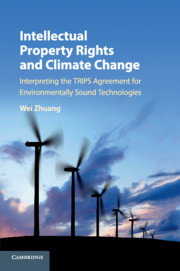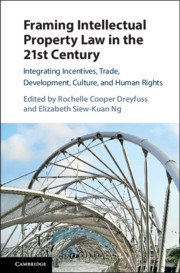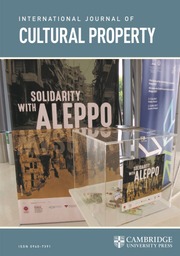Intellectual Property Rights and Climate Change
As the world confronts global warming, there is a growing consensus that the TRIPS Agreement could be a more effective instrument for mitigating climate change. In this innovative work, Wei Zhuang systematically examines the contextual elements that can be used in the interpretation of the TRIPS Agreement with a view to enhancing innovation and transfer of environmentally sound technologies. Zhuang proposes a balanced and pro-competitive interpretation that could be pursued by policymakers and negotiators. This comprehensive, multidisciplinary study will help academics and policymakers improve their understanding of the contemporary international legal regimes governing intellectual property rights, as well as innovation and transfer of environmentally sound technologies. It also offers practical guidance for further developing a legal system capable of responding to the challenges posed by climate change.
- Provides a comprehensive analysis of innovation and transfer of environmentally sustainable technologies
- An interdisciplinary work, covering economics and various areas of law including intellectual property law, competition law, environmental law, the law of treaties and WTO law
- Has a practical relevance, especially after the adoption of the Paris Agreement
Reviews & endorsements
'A valuable assessment of the limits and strengths of the international intellectual property rights framework in addressing the climate change threat through technological innovation. This book represents an important reflection on avenues to challenge entrenched global asymmetries in the innovation and transfer of environmentally sound technologies through a well-adapted and efficient implementation of the TRIPS Agreement.' Pedro Roffe, International Center for Trade and Sustainable Development, Geneva
'This book offers a solid and in-depth analysis of the flexibilities available under the World Trade Organization TRIPS Agreement in the context of environmentally sound technologies (ESTs). Dr. Wei Zhuang succeeds in showing how the UN Framework Convention on Climate Change technology transfer obligation should guide the interpretation of the TRIPS Agreement in the EST context.' Christoph Spennemann, Legal Officer and Officer-in-Charge, Intellectual Property Unit, Division on Investment and Enterprise, United Nations Conference on Trade and Development
'This book provides a comprehensive treatment of a major challenge. It is widely acknowledged that fighting climate change requires not only technological but also legal innovation so as to find a satisfactory balance between IPRs protection and technology diffusion. The significant contribution of Wei Zhuang's study is precisely to show how the TRIPS Agreement can be interpreted to allow sufficient space for much needed technology diffusion.' Jorge E. Viñuales, University of Cambridge
'This book offers an excellent and comprehensive examination of the tensions surrounding global intellectual property rights and the cross-border diffusion of the technologies necessary to fight climate change. Wei Zhuang's intriguing ideas will provoke scholars and policymakers in both developed and developing countries alike, as the world struggles to find the right balance.' Mark Wu, Harvard University, Massachusetts
'This book represents a unique and important contribution to the academic literature concerning climate change. It is well-researched and thought-provoking. Perhaps more significantly, it is a practically-minded text. The author's suggestions for how the TRIPS Agreement should be interpreted, and how such interpretations may be codified, are well-developed and usable. This is important, because it does not always seem that the urgency of society's action on climate change matches the urgency of the problem. Dr Zhuang should be commended for writing this study, which policymakers in the relevant area should read with concentration.' Alex Woolgar, Journal of Intellectual Property Law and Practice
Product details
August 2019Paperback
9781108726214
467 pages
230 × 152 × 25 mm
0.6kg
7 b/w illus.
Available
Table of Contents
- List of figures
- Foreword Carlos Correa
- Acknowledgements
- Table of cases
- Table of treaties, declarations, resolutions and others
- List of abbreviations
- 1. Introduction
- Part I. Intellectual Property Rights, Innovation and Transfer of ESTs:
- 2. Concepts and context: IPRs, innovation and transfer of ESTs
- 3. International legal framework governing IPRs, innovation and transfer of technologies, including ESTs
- 4. The effects of minimum IPR standards shaped by TRIPS on innovation and transfer of ESTs
- Part II. Interpreting the TRIPS Agreement for Facilitating Innovation and Transfer of ESTs:
- 5. Rules governing treaty interpretation and the elements against which the TRIPS agreement should be interpreted
- 6. Interpreting patent-related flexibilities in the TRIPS agreement for facilitating innovation and transfer of ESTs
- 7. Interpreting competition-related flexibilities in the TRIPS agreement for facilitating innovation and transfer of ESTs
- 8. Conclusions and recommendations
- Bibliography
- Index.





